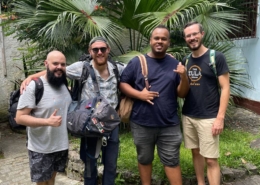 https://www.chosenpeople.com/wp-content/uploads/2023/05/New-Zealand-Hiking-Picture.jpg
1330
2000
cpm
https://www.chosenpeople.com/wp-content/uploads/2020/01/CPM-Logo-small-495x256.png
cpm2023-05-22 12:52:032023-05-22 15:56:07May 2023 News Briefs
https://www.chosenpeople.com/wp-content/uploads/2023/05/New-Zealand-Hiking-Picture.jpg
1330
2000
cpm
https://www.chosenpeople.com/wp-content/uploads/2020/01/CPM-Logo-small-495x256.png
cpm2023-05-22 12:52:032023-05-22 15:56:07May 2023 News BriefsFor several years now, we have coordinated a vibrant global ministry to young Israelis as they travel the world after their mandatory army service. Their post-military year is a key transitional time for twenty-something Israeli men and women before they embark on a path to a vocation or university. They are discerning their next steps and are remarkably open to discussing life’s biggest questions.
Your Mission to the Jewish People oversees a global network of hostels and hosts who welcome Israelis to stay with them. Staff and volunteers embody the love of Jesus through hospitality—by cooking meals, organizing tours of local sites, providing games, etc. When appropriate, we broach spiritual conversations.
In this article, you will get an inside look at a few of our hostels and hosts—those in Brazil, Japan, and Bolivia, and discover how Israeli travelers might spend up to a week with us. You will also hear directly from some Israelis we interviewed about their post-military travels. Ultimately, you will see how our hospitality network is meeting the needs of wandering Israelis—both physically and spiritually.
A Typical Week at Our Global Hostels
Sunday
Hosts in Brazil take guests to some of their favorite places in the area. Excursions may include local beaches like Itacoatiara Beach or an ice cream shop in São Francisco.
Guests at our hostel in Tokyo might visit a local café for lunch and even trade hummus recipes with the owner. They might also take a walk in the nearby historical Kyū-Furukawa Gardens to soak up Japanese nature, including Japanese maples, plum blossoms, and koi fish in a pond.

Our global hosts serve Israelis who come from all kinds of religious backgrounds with various views about God. Many Israelis grow up secular—not consistently going to synagogue or practicing Judaism but still valuing Jewish identity. One man said, “I grew up secular, but I was always interested in what it meant to be Jewish.”
A small but growing minority of Israelis grow up in believing homes. They know about the gospel but also need to embrace it for themselves. One person explained, “I was born into a family who believes in Jesus, but it was never a part of me. I would go to church sometimes and read the Bible, but it never spoke to me. I felt it was a faith that belonged only to my mother and my siblings.” Wherever our guests are spiritually, we seek to know each person’s story and how we can show them the love of Jesus.
Monday
Since our hostel in Brazil is new and not yet well-known among Israeli travelers, our volunteers stay for now at other hostels popular with Israelis. Along the way, they hope to meet Israelis and invite them to our ministry’s new guesthouse.
In Tokyo, guests may take an evening stroll through the nearby Rikugien Gardens, home to a 300-year-old giant cherry blossom tree. While there, guests can enjoy spring desserts and amazake (a sweet, rice-based drink), while winding their way through the garden, which is lit up to celebrate the blossoms!
Our Japanese hosts love music and may play instruments with guests in the evenings.
Most Israeli travelers we welcome have recently completed their required army service, which can be a difficult time, raising many hard questions. One woman told us, “During my service, I felt a lot of hatred toward myself, as I tended to compare myself to others. I started to think that life had no meaning and, over time, I developed a lot of hatred and anger toward God. I thought He was a bad God who played with humans, and that it was fun for Him to watch us suffer.” These challenges and questions make it relatively easy to engage Israelis in deep conversations.
Tuesday
Israelis staying at our guesthouse in Tokyo may visit a sumo pen in Ryogoku, where sumo wrestlers live and train. While eating at a nearby sumo restaurant, the guests may spot several sumo wrestlers in traditional dress.
As these young Israelis travel, they often ponder and plan their next big steps in life—like what to study, what career to pursue, and where to live. Exciting, but often stressful, topics like these lead to even deeper questions about God and life’s purpose. One woman noted, “I had a lot of questions about existence—why we humans were created and what the purpose of life is.”
Wednesday
Guests in Tokyo may pack a lunch to enjoy outside under the cherry blossoms. Then, they may join our hosts for a Japanese pottery class just five minutes from the guesthouse.
One Israeli man who traveled in Bolivia was staying at the home of a volunteer Christian couple. He describes how his Christian hosts showed him love. He admitted, “God is about love. I wondered, ‘Why did they care for us like that?’ I could see they had an unusual grace.”
Thursday
Israeli guests staying with us in Tokyo may walk the Imperial Gardens in nearby Hibiya Park, and they might also enjoy a stretch on the emperor’s pristine lawn.
Exploring nature is a common activity at our hostels in beautiful destinations around the world. These excursions are not just about seeing dazzling scenery, though. One Israeli woman said, “I decided I was going to travel, and as I saw the landscapes and wondrous creation, it further proved to me God exists.”
Friday
By Friday, volunteers in Brazil who stayed at other hostels return to the ministry at the new guesthouse. Hopefully, some of the Israeli travelers they met come with them.
Guests in Tokyo may take a morning manga-drawing class with a local manga artist and illustrator!
Our hostels host a Sabbath dinner on Friday night for staff and guests. The Israeli guests often work with our volunteers to make beloved Jewish dishes. The menu also features local specialties. For instance, our guesthouse in Japan prepares temaki sushi, a culinary experience in which guests fill and roll their own sushi. The joyous, family-style environment of our Sabbath celebration leads to great conversations, often including discussions about faith. Our volunteers have many opportunities to tell their testimonies during this special meal. Clearly, the weekly Sabbath dinner is one of the key highlights at our hostels!
Saturday
Our Tokyo guest house may prepare a shakshuka breakfast party. (Shakshuka is a tomato-based stew topped with eggs and is a common breakfast dish in the Middle East.) Hosts then invite guests to join them for a morning service at the local Messianic congregation and stay for a wonderful lunch!
Fruit from Our Labor

We always rejoice when we see fruit from our global hostel work, like with this Israeli man who came to faith after traveling the world:
I was always looking for spirituality, but in the wrong place (like falling in love with a woman or through acts of charity). As a child, I had a sense of Jesus. After seeing all the troubles in the world and in the country, I would say to the sky, “Let’s see you come down and fix things,” and I saw an image of Jesus on the cross. God was always speaking to me all my life; what He spoke was confirmed later—it all came together. After coming to faith, it became clearer.
Although only a few hostels are mentioned here, there are also very popular guesthouses in India and New Zealand, about which we have written at great length elsewhere. We are also expanding this ministry of hospitality by bringing a hosting network to the United States. You will not only learn more about this outreach in the coming months, but you may also have the opportunity to be part of this network! Stay tuned!
Published in May 2023.




